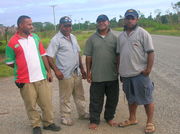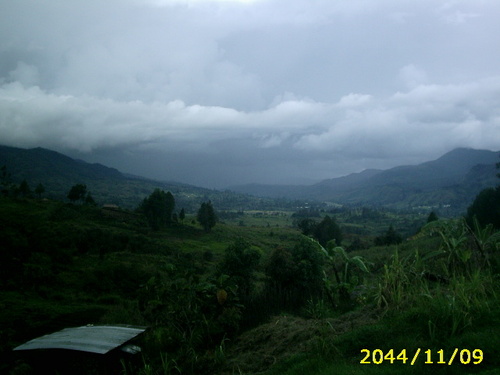THE MENDPHO TRIBE
The Mendpho Tribe of Esenda Villiage, Mendi, Southern Highlands Province, Papua New Guinea
The Mendpho Tribe of Esenda Village in the Mendi District of Papua New Guinea number more that 150 people. This is the smallest minority to be found anywhere in the world. They speak the Mendi Language. Most Mendphos live in the traditional way of life, mostly subsistance farming in their home Land. The food gardens are in Mhill, Simir and Ulpar Ipa. The tribe drinking water is Mol Ipa and the washing river is Bol Ipa. The tribal meeting arear is known as "Pongpa Homa" although there other small grounds in Esenda like Paki's Homa, Tondwol's Homa and Mikmik's Homa.
The Mendphos have all their enemy tribes living next to and arround them.
Recently the Mendpho people have moved and to Australia as professionals and are now building coloney there.
Notice to all Mendphos!
The most basic issue and major problem facing
The effect of inflation
The major effect of inflation as we know it is the deterioration of the “Real Value of the Kina”. What is the real value of kina? Economist would agree with me that the real value of money is a measure of what one unit of money can buy in one given time. For example one year ago, a five kina (K5) would purchase two 1kg rice parcels. Now in the present time, one year later, the same K5 can only purchase one 1kg rice parcel. That is in its simplest terms, the loss in value of money hence the deterioration of the real value of the kina. Therefore, effectively there is less kina in the pocket of the man on the street now than a year ago. The man from a year ago was better off.
In the midst of this, our students at the PNG University of Technology, as learned responsible citizens, have taken the rightful and honourable step by declaring that
I further note that a review of the minimum wages and increasing the minimum wages would not automatically result in putting more money in the ordinary man’s pocket as organisations that pay for the increased wages would also increase the prices of goods and services they supply. This will erode any monetary increase received by the worker, but more importantly we would only be going around in a never ending cycle as the process will repeat itself i.e. Inflation, wage increase and inflation again then to wage increase and repeat the same over and over.
With the previous discussion in mind, I would like to suggest to the government to take the following suggestions seriously and implement these now. The way to improve the real value of the kina and put more money in the pockets of the ordinary Papua New Guinean is to reduce personal income taxes, reduce the price of good and services on the selves by reducing the rate of goods and services tax (GST), and give a tax break to low income earners by increasing the tax bracket for zero tax of low income earners.
The government in its budget for the 2007 fiscal year amended the personal income tax rates by reducing the tax rates. As an example when I reviewed the 2008 personal income tax rates table issued by the Internal Revenue Commission (IRC), I note that this reduction meant a K16 reduction in the tax I pay per fortnight and increased my net pay by K16 per fortnight. This means that my gross pay did not change but my net certainly changed and I have K16 extra which, in 2007 I did not have. Further, the organisation I work for did not see this as a problem because this did not increase its salary and wages expenses. Business expenses in salaries and wages are still constant but my net pay increased, and the company had no reason to increase the price of the services it sells to the public.
From my personal experience above and as experienced by the working population, I would suggest to the government to act now and reduce personal income taxes even further. One of the agendas in the special parliament sitting this month should be to amend the Rates Act and reduce the tax rates even further. A decrease in tax per fortnight by K50 would be admirable and all affordable by the government and the economy considering the high economic growth rate we are experiencing now. This would be a means of transferring the benefits of the high economic growth to the hard working population. This would be a deserving reward for the patience and the tight belts we have shown and worn over the last ten years. Moreover, a major reduction in the personal income taxes would put more money into the ordinary man’s pocket with no direct consequence to the employers. This would make goods and services on the shelves more affordable.
The government has no control over the costing in supplying a good or service by a private enterprise. This is to say that the government has no right to tell the private enterprise how much to incur in producing and supplying a good or service. For example, governments do not have the right to make a law saying the cost to make and supply a parcel of rice to the public should be only
When looking at the price of the goods and services on the shelves, the only component of that price of that good or service the government directly and immediately has control over and can change is the 10% GST portion.
The government in the planned special parliament session this month must amend the GST Act to reduce the GST rate by 5% from 10%. A 5% reduction will should translate to a 5% reduction in prices of all goods and services that contain GST. Further this will have the effect of reducing the high inflation rate we are experiencing today.
The minimum wages in
However, higher minimum wages alone will not arrest the problem of rising cost of living. As stated earlier, higher minimum wages will have the resulting effect of raising the price of goods and services, hence more or lees no major improvement will be realisable.
With this mind, with the amendment to the Rates Act the government must also set the tax bracket for fortnightly income of K500 and less to be at zero rate personal income tax. That means people who earn K500 and less per fortnight should not be paying any salary and wages tax. This will make the new minimum wages structure more effective and meaningful to the general worker. An increase in minimum wage with out resetting the tax brackets will mean nothing as any increase in wages will be watered down by tax. A concurrent adjustment in wage rise and tax reduction will put more money into the pockets of the people.
The special emergency parliament sitting that has been proposed is an important opportunity to pass these amendments and effectively show the people of
Thank you for reading my opinions
William Kep
The true land owners of Mendi Valley!
Calling on all Mendpho tribesman and woman to contribute articles and pictorial hostory about our tribe here. Please contact Mend William on 675+6744860 or email william_kep@mendpho.mysite.com to contribute to make this site truly a mendpho one and source of our history and pride.
Notice to all Mendphos that Componsation for the Humsems will be paid in Christmas of 2008.
Mendi Town
The Mendphos will pay a Moka to the Embias at the end of November 2007. All Mendphos are hereby called to contribute in cash only!
MD4 is short for Mendpho!

